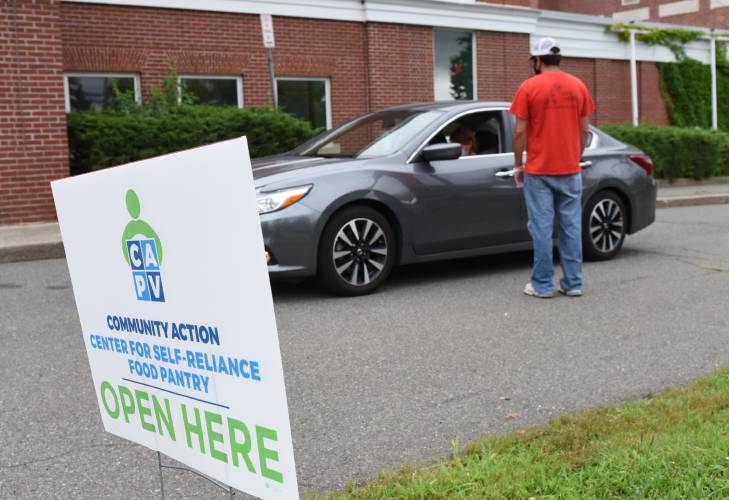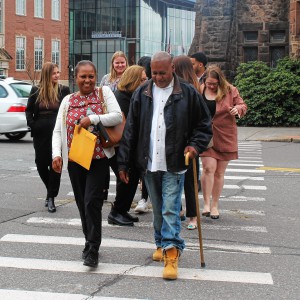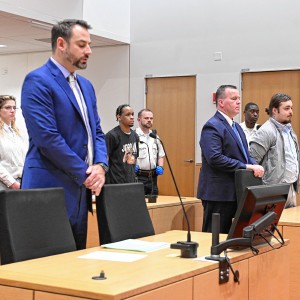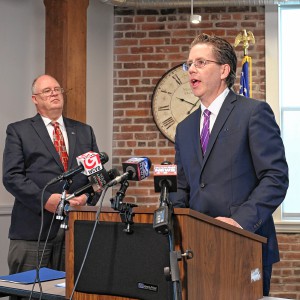Gov. Healey’s budget cut puts region’s antipoverty services in jeopardy

Community Action Pioneer Valley’s food pantry is one of many programs that may need to be scaled back after the governor vetoed funding for the state’s community action agencies. STAFF FILE PHOTO/PAUL FRANZ
| Published: 08-23-2023 4:52 PM |
BOSTON — Community Action Pioneer Valley is looking at scaling back a host of programs that support low-income residents throughout the Valley after Gov. Maura Healey this month vetoed significant funding for the state’s 23 community action agencies.
The agencies successfully pressed for about a decade to secure more dedicated funding from the state, pitching their work as a crucial way to help vulnerable Bay Staters navigate anything from job training to housing insecurity.
Leaders of those organizations are now sounding the alarm that they will need to rein in antipoverty services thanks to Healey’s veto of the latest $7.7 million tranche of funding from the fiscal 2024 state budget.
Locally, Community Action Pioneer Valley will lose approximately $277,000 in funding for its upcoming fiscal year, which begins in October. Executive Director Clare Higgins said the funding, which has steadily increased in recent years, typically goes to several aspects of the agency, including its food pantry, information and referral services and other programs supporting low-income residents.
“We use it to meet the needs of people living on low incomes,” Higgins said, adding this funding often allows the agency to adapt to any situation. “The great thing about a community agency is we can respond in the moment if we have this flexible money. Right now, our flexibility is gone.”
As it prepares to craft a budget at a deficit, Higgins said Community Action Pioneer Valley, which covers communities throughout Franklin and Hampshire counties and the North Quabbin region, may not fill positions or will have to reduce other programs to balance its budget.
Other agencies statewide are in a similar situation.
The Community Action Agency of Somerville will lose about half of its community organizing budget, money that the organization had used to educate renters about their rights, advocate for improved living conditions, and successfully press the city to expand a municipal eviction moratorium during the pandemic.
Article continues after...
Yesterday's Most Read Articles
 Greenfield homicide victim to be memorialized in Pittsfield
Greenfield homicide victim to be memorialized in Pittsfield
 Former Greenfield man granted new trial after 1995 murder conviction, walks free
Former Greenfield man granted new trial after 1995 murder conviction, walks free
 On The Ridge with Joe Judd: What time should you turkey hunt?
On The Ridge with Joe Judd: What time should you turkey hunt?
 Judge sets bail for Millers Falls assault suspects
Judge sets bail for Millers Falls assault suspects
 Franklin Tech student welds artistic bench for French King Bridge
Franklin Tech student welds artistic bench for French King Bridge
 As I See It: Between Israel and Palestine: Which side should we be on, and why?
As I See It: Between Israel and Palestine: Which side should we be on, and why?
David Gibbs, CAAS’s executive director, and Nicole Eigbrett, its director of community organizing, said they might need to lay off staff if they cannot make up the lost state support through private fundraising.
“Losing the staffing is going to be disastrous for the program because organizers kind of multiply their impact through the network of relationships that we can build,” Eigbrett said. “If one organizer is capable of educating 10 tenants on their rights, those 10 tenants will be able to reach 10 more neighbors and so on and so forth. The work that we’ve been doing has both material and intangible impacts.”
Community action agencies receive funding from a variety of sources. A bit less than two-thirds come from the federal government, and roughly a third comes from the state via a variety of pathways, according to Joe Diamond, executive director of the Mass. Association for Community Action, or MASSCAP.
Since fiscal year 2021 — the first full spending cycle during the public health emergency — Beacon Hill has included additional money in the annual state budget to provide community action agencies with operational grants.
The money included in the budget served as “the most flexible resource that the community action agencies receive,” Diamond said, giving agency leaders bandwidth to invest in better programming as they saw fit.
“It supports our ability to address needs that existed long before COVID and needs that persist today, some of which are exacerbated, like the need for food security,” he said. “Our agencies use this resource to help expand their ability to provide more and more food to the people that we serve, to expand their reach geographically, to provide housing assistance. Some agencies have used it to expand and continue mental health services, and certainly to support job readiness across the state.”
Higgins echoed that statement and said the pandemic’s effects are still hitting people, despite the emergency declaration ending.
“We’ve been pushing for that money long before the pandemic and the need hasn’t gone away … the cost of living has gone up, food is more expensive, rent is more expensive and the pandemic protections … all of that is gone,” Higgins said. “We’re actually seeing people being impacted harder right now than they may have been a few years ago.”
For many agencies, the funding in the annual state budget was “a significant part of their budgets,” Diamond said.
Legislative negotiators agreed to direct another $7.68 million toward that end in their proposed fiscal 2024 budget, but Healey used her veto pen to reduce the line item to zero, writing that “its original purpose was specifically tied to addressing the COVID-19 pandemic.”
Administration officials argue that the funding was never meant to be permanent and that they now need to reevaluate emergency-era spending, which surged in many areas to respond to the crisis. They also pointed to other areas of the budget that focus on supporting lower-income families, such as a 27% increase to the Residential Assistance for Families in Transition (RAFT) program and $25 million in permanent food security infrastructure grants.
“Our administration is proud to have signed a budget that invests in critical programs that support low-income families in Massachusetts,” said Healey spokesperson Karissa Hand. “Community action agencies perform important services for our communities, and we will continue to support their mission.”
Healey also cut $1 million from another line item offering grants to Head Start programs that some community action agencies such as CAAS run, dropping it down to $16.5 million.
But for those on the ground at community action agencies, the official arguments do not entirely add up.
“I don’t understand a Democratic governor choosing to make that call,” Gibbs said. “If you’re going to try to balance the budget, you don’t do it on the backs of the people who need it the most. There are plenty of state spending lines that are very helpful to business, that are very helpful to wealthy cities and suburbs. I’m sure the governor could find $200 million there if she needed to. To take it away from programs that are directly supporting people who are in desperate need, who are in poverty, just makes no sense.”
Higgins added Healey has “done some really great things” in the budget for people living with low incomes, however, cutting this type of funding may reduce the ability of agencies like Community Action Pioneer Valley to assist people, which may cause further financial strain on other programs.
Community action agency leaders hope they can convince Democrats who control the House and Senate to override Healey’s veto and restore their funding.
Legislative leaders have not indicated override plans, and lawmakers are on an extended break from major business that’s expected to last into September.

 Fogbuster Coffee Works, formerly Pierce Brothers, celebrating 30 years in business
Fogbuster Coffee Works, formerly Pierce Brothers, celebrating 30 years in business 1989 homicide victim found in Warwick ID’d through genetic testing, but some mysteries remain
1989 homicide victim found in Warwick ID’d through genetic testing, but some mysteries remain Doors open at Tilton Library’s temporary home at South Deerfield Congregational Church
Doors open at Tilton Library’s temporary home at South Deerfield Congregational Church DA to announce breakthrough in 1989 unsolved homicide in Warwick
DA to announce breakthrough in 1989 unsolved homicide in Warwick
